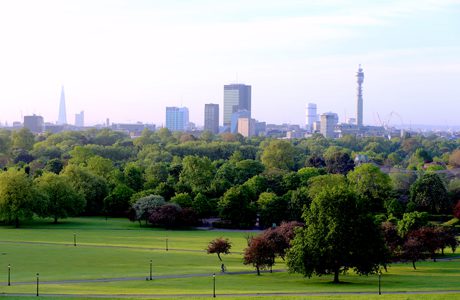
New research by Vivid Economics published on 24 October by the National Trust appears to reveal the true value of a large city’s network of public parks and greenspaces – and shows that cutting parks budgets is counter-productive, costing more than it saves.
This evidence comes as MPs on the influential House of Commons Communities and Local Government Committee begin hearing evidence for their inquiry into the funding crisis facing public parks. Recent Heritage Lottery Fund research showed that many councils face unsustainable cuts to their parks budgets of up to 20% – with some councils facing very large cuts of 50-100% by 2020.
The Vivid Economics research was sponsored by National Trust, and looked at the economic contribution made by Sheffield’s greenspaces to society. It found:
· Parks provide benefits worth £1.2bn, not a liability of £16m as they appear in conventional public accounts;
· For every £1 spent on public parks, society receives £34 worth of benefits;
· Around 60% of the benefits of public parks in a large city arise from their contribution to physical and mental wellbeing.
Robin Smale, Director at Vivid Economics, said: “Parks generate a large surplus for society in contrast to the financial liability that they appear to be in Local Authority financial statements. It’s essential that decisions about our parks are based on comprehensive and balanced financial accounts, which incorporate the full value of public services. Reliance on the very partial expenditure and revenue records available to Local Authorities will be against the public interest.”
The launch of this research comes days after a major conference for local government on the crisis facing public parks held on Thursday 20 October by Winckworth Sherwood, Social Finance and the National Trust.
The conference saw the launch of www.futureparks.org, a new National Trust toolkit for local authorities to help those wanting to transform their parks across a whole city or place. The toolkit brings together the essential expertise and practical guidance for Councils wanting to consider a Parks Trust as a strategic option for their parks portfolio.
Helen Ghosh, Director-General of the National Trust said: “We need to act now to secure great parks for people for the next 100 years. Public parks matter, not only as much loved spaces for millions of people to relax and play for free, but also for their role in the health, prosperity and resilience of our towns and cities.”
Despite the scale and urgency of the challenge, the message from the conference was that bold change was possible, with inspiration and optimism from those local authorities already transforming their parks.
Joanna Bussell, Partner at Winckworth Sherwood, said: “We have the know-how to help local authorities transform their parks. We should take confidence from those who are blazing a trail. We are encouraging all our local authority clients to explore alternative delivery models for their parks. There is real scope to build solutions for parks sensitive to each place and its communities.”
The conference also discussed the opportunities from social investment to protect and grow public benefits, for example, community enterprise to generate income for parks or developing new health services from parks.
David Blood, Chairman of Social Finance, said: “Social Finance is pleased to be partnering with the National Trust to further the ambition of both protecting and enhancing our public parks through new financial models. We believe these models have the potential to remove parks from the insecurity of annual public budgeting cycles, protecting them for generations to come.”
The conference heard from speakers and delegates calling on central government to support local authorities in making the transition to a new future for their parks services. There is currently no help available from national government or agencies.
Simon O’Brien, Chair of the Liverpool Green and Open Spaces Review, said: “The amazing parks in our cities are often the result of ordinary people’s contributions and passion for their local places over generations. We must do everything we can to protect and grow their legacy. The traditional parks model is broken. We need the Government to support local authorities in developing alternatives that stand the test of time. Cities like Liverpool are ambitious for their parks and their people, they are prepared for bold solutions, but they need a little bit of help to build them.”







